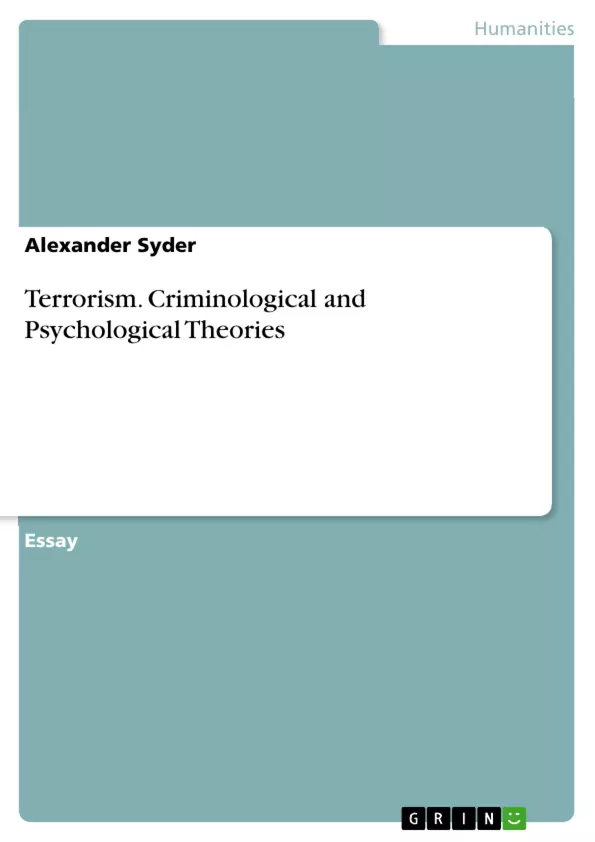The present essay provides an overview over the current literature - from the viewpoint of both criminological and psychological theory - on the essence of, and motivation for, terrorism and terrorist acts.
The field of terrorism has been explored widely across the social sciences, including by political and psychological theory, in regard to its varied nature, motivation and application. There are a large number of identified definitions of what would constitute ‘terrorism’ under national and international law. Currently, Dry Run terrorism; Cyber terrorism; Individual terrorism; Lone Wolf terrorism; Bioterrorism; Radicalised terrorism; and Eco-Home grown terrorism have been identified. Due to these various formats of what would constitute ‘terrorism’ and a ‘terrorist act’, over a hundred definitions of ‘terrorism’ have been identified in the existing academic literature.
However, the international community has been unable to agree upon a universal definition. The term of ‘terrorism’, however, is rooted in the political discourse of the French, more specifically the French Revolution where the use of the term a ‘reign of terror’ came into being. The French word terrorisme derives from the Latin verb terreȯ meaning ‘I frighten’. The defeat of the Jacobins transformed the word into a powerful new governmental form of criminality. Despite its origins in governmental atrocities towards citizens, it now applies to individual citizen acts as well as organizations and national state governments.
Inhaltsverzeichnis (Table of Contents)
- Criminological and Psychological Theories of Terrorism
- Criminological Theories
- Strain Theory
- Rational Choice Theory
- Psychological Theories
Zielsetzung und Themenschwerpunkte (Objectives and Key Themes)
This text aims to provide a comprehensive analysis of both criminological and psychological theories of terrorism by critically contrasting their perspectives and exploring their strengths and limitations. This analysis synthesizes relevant research and theory to offer a deeper understanding of the complex motivations and factors that contribute to terrorism.
- The nature and definition of terrorism
- Criminological theories of terrorism, including Strain Theory and Rational Choice Theory
- Psychological theories of terrorism, focusing on individual motivations and behavioral factors
- The role of social and political influences in terrorist activity
- The limitations of both criminological and psychological approaches to understanding terrorism
Zusammenfassung der Kapitel (Chapter Summaries)
- Criminological and Psychological Theories of Terrorism: An Introduction
This chapter provides a comprehensive overview of the various definitions and interpretations of terrorism, examining its historical roots and evolving nature. It also introduces the key differences between criminological and psychological approaches to understanding terrorism, setting the stage for a comparative analysis of their theoretical frameworks. - Criminological Theories of Terrorism: Strain Theory and Rational Choice Theory
This chapter delves into two prominent criminological theories of terrorism: Strain Theory and Rational Choice Theory. It explores how these theories explain the motivations and justifications for terrorist actions, examining their strengths and limitations in accounting for the complex factors that contribute to terrorism. - Psychological Theories of Terrorism: Exploring Individual Motivations and Behavioral Factors
This chapter focuses on the psychological perspectives on terrorism, examining how individual motivations, personality traits, and cognitive processes contribute to the phenomenon. It explores the role of psychological factors such as frustration, desire for excitement, and the seduction of violence in driving individuals to commit terrorist acts.
Schlüsselwörter (Keywords)
Terrorism, criminology, psychology, Strain Theory, Rational Choice Theory, psychological predispositions, radicalization, individual motivations, social influences, political influences, behavioral factors, cognitive processes.
Frequently Asked Questions
Why is there no universal definition of terrorism?
The international community has been unable to agree on a single definition because terrorism is viewed through various political, national, and international lenses, resulting in over a hundred different academic definitions.
What are the historical roots of the term "terrorism"?
The term is rooted in the French Revolution's "reign of terror" (terrorisme), derived from the Latin "terrere," meaning "I frighten." It originally referred to governmental atrocities.
What is the difference between Strain Theory and Rational Choice Theory?
Strain Theory looks at social pressures and frustrations that drive individuals to crime, while Rational Choice Theory views terrorism as a calculated decision based on perceived benefits and goals.
What psychological factors contribute to terrorist motivations?
Psychological perspectives focus on individual traits, cognitive processes, frustration, the desire for excitement, and the seduction of violence.
What types of terrorism are identified in current literature?
Identified forms include Cyber terrorism, Lone Wolf terrorism, Bioterrorism, Radicalised terrorism, and Eco-Home grown terrorism, among others.
- Quote paper
- Alexander Syder (Author), 2017, Terrorism. Criminological and Psychological Theories, Munich, GRIN Verlag, https://www.grin.com/document/352074



